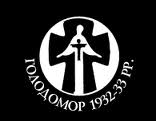In the early 1930s, in a region considered to be Europe’s breadbasket, Stalin’s Communist regime committed a horrendous act of genocide against the Ukrainian people. An ancient nation of agriculturists was subjected to starvation, one of the most ruthless forms of torture and death.
The Soviet government imposed exorbitant grain quotas, in some cases confiscating supplies down to the last seed. In many villages special troops were brought in to gather any and all food that could be found, including meagre supplies that hungry families managed to save or scavenge. Armed units isolated the territory of Soviet Ukraine and the predominantly Ukrainian-populated Kuban region of Soviet Russia, to stop the starving from going to neighbouring Soviet regions in search of food.
The result was the Ukrainian genocide of 1932-33, known in Ukrainian as the Holodomor, or extermination by famine. An estimated 10 million Ukrainian men, women and children perished. (Source: www.ucc.ca)
For decades, the Soviet regime kept this atrocity a secret, threatening any survivors who dared to mention it. The western media, in particular the New York Times, was also complicit in the cover up.
I first learned about the Holodomor in 1982, while studying Russian and Ukrainian history at the University of Manitoba. During the 50th anniversary commemorations of the Holodomor I was shocked and dismayed to encounter blatant denials by prominent academics, journalists and politicians.
In the three decades since, irrefutable evidence has surfaced, including statistics and reports that the Kremlin had kept sealed until the collapse of soviet communism. Today, the deniers have been largely discredited, if not silenced. No longer able to credibly dispute the facts, they now dispute the tally of the dead, and the labelling of Holodomor as genocide.
Today, the Holodomor is finally, if slowly, becoming known, and recognized, around the world.
Internationally, 16 countries have officially recognized the Holodomor as an act of genocide. Here in Canada, the Government of Canada unanimously passed the Ukrainian Famine and Genocide (“Holodomor”) Memorial Day Act on May 29, 2008. The Act recognizes the Holodomor as an act of genocide, and proclaims the fourth Saturday of each November Holodomor Memorial Day.
The Provinces of Saskatchewan, Manitoba, Alberta, Ontario and Quebec have passed similar legislation.
The international campaign continues for all countries of the world, and the United Nations, to recognize the Holodomor, Ukrainian Famine-Genocide of 1932-33 as a genocide of the Ukrainian people.
Meanwhile, on Saturday, November 23, 2013, please observe National Holodomor Memorial Day. Participate in Holodomor commemoration events and memorial services in your local community. And in the evening, at 19:32 (7:32 pm) local time, please pause for a moment of silence and light a candle of remembrance in your home.
Please do this in honour of the millions who perished so needlessly. Vichnaya pam’yat. (Memory Eternal).
And do it to honour those who survived, only to endure a lifetime of sorrow and denial of their horrifying experience.


